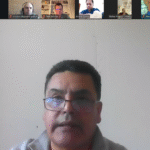Read this article in:
English
16 September, 2025Mental health emerged as a common concern during the recent online meeting of the CMPC workers’ unions network, which brought together union representatives from Argentina, Brazil, Chile, Peru and Uruguay, along with Alejandro Valerio, IndustriALL deputy regional secretary for Latin America and the Caribbean and Tom Grinter, IndustriALL pulp and paper sector director.
The aim of the meeting was to strengthen the regional network of unions representing workers at CMPC – a Chilean pulp and paper multinational with manufacturing operations in more than 10 countries, including Chile (its headquarters), Brazil, Argentina, Mexico, Peru and Uruguay – and to promote experience sharing and joint initiatives to improve working conditions.
One of the main points agreed on was the need to prioritise action in the area of occupational health and safety, with particular emphasis on mental health. This issue was repeatedly raised by representatives from different countries, concerned with the consequences of the excessive work pace, staff shortages, long working hours and unsafe or violent work environments, risk factors identified by the World Health Organization (WHO).
Reflecting the article Mental health – an important part of health and safety, published by IndustriALL, it was highlighted that while protecting mental health at work is part of an employers’ duty of care, trade unions also have a key role to play in preventing and tackling these issues. Understanding the risks and knowing how to intervene is fundamental to improving the quality of working life.
During the meeting, the network’s coordinators, Walter Fogaça (Brazil) and Claudio Ríos (Chile), gave an update on trade union actions at regional level, while the country representatives presented the situation at their plants. Mental health was highlighted as an issue common to all of them.
Tom Grinter gave a global overview of the sector, mentioning the progress made at the recent conference in Jakarta and suggesting ways forward, such as regular meetings, targeted research on production and supply chains, a regional database and initiatives to strengthen trade union networks.
Alejandro Valerio closed the meeting by outlining the next steps to be taken, such as conducting trade union mapping of the region, making progress with the drive to unionise outsourced workers and creating a joint space for health and safety at work, with special emphasis on mental health.
Finally, he stressed the crucial role played by trade union networks:
“They are a very useful tool for people working for the same multinational in different countries, helping them build union power and develop joint actions to achieve better social dialogue with the company, establishing regional benchmarks to try level up labour rights and social benefits in every country where the same company operates.”
Photo: Fabiano Panizzi para Tissue online







